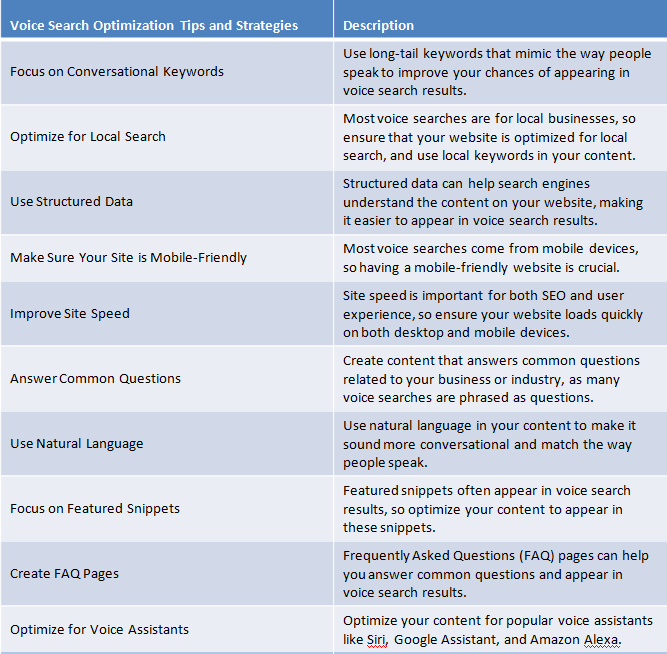As an online marketer, you know how important it is to keep up with the latest trends in digital marketing. One trend that has been rapidly gaining traction lately is voice search optimization. With more people using their smartphones and connected devices to search for what they need, marketers must adapt their strategies accordingly to meet this new wave of customers. In today’s blog post, I will provide you with some essential tips and techniques on how to optimize content for voice search so you can maximize your reach and engage with a broader audience than ever before. Let’s dive in!
Table of Contents
ToggleWhat is Voice Search Optimization?
Voice Search Optimization is the process of optimizing your webpage or online content for searching with voice-based searches. It helps companies’ websites and content get the most visibility with search engine results by tailoring their web pages to voice search queries. It follows specific rules such as using natural, conversational language and focusing on long-tail keywords geared toward the spoken rather than the written word.
This means optimizing content, tags, and titles to phrases people would naturally ask out loud, such as “how do I” or “where can I”. By adhering to voice search optimization rules, businesses can make sure their websites show up on the first page of various voice search results provided by Alexa or Google Home.
Additionally, one should create a website structure that enables voice search optimization to serve quick and accurate answers to user questions. Utilizing this process can ensure that one’s web pages are as visible as possible within traditional and voice searches and keep pace with technological changes.
How Does Voice Optimization Search Work?

It’s a type of software that interprets natural language from a user and then searches the data it finds to process the query and return accurate results. To make this happen, voice optimization search requires advanced artificial intelligence algorithms that can recognize speech patterns, decipher syntax and interpret semantics. This allows users to speak in plain language instead of rigidly structured phrases and quickly get relevant answers or information.
In addition, the technology uses advanced algorithms and data analysis techniques to identify popular questions people ask worldwide and pull relevant information from the internet. Lastly, voice optimization programs use artificial neural networks to learn how users interact with such systems to ensure they produce better results over time.
In short, voice optimization search opens new possibilities by allowing us to interact with computers through speech alone.
The Importance of Voice Search Optimization

The use of voice search technology has grown exponentially in recent years, so it is now essential to consider how to optimize for it. Voice search optimization involves relevancy and understanding natural language so that when someone issues a voice command, their response is relevant, accurate, and helpful. It is also necessary to ensure that your website or program ranks well when people use various voice assistants.
The importance of employing voice search optimization encompasses increased visibility, increased brand awareness, improved interaction with customers, and overall higher conversions. Voice search optimization can help businesses bring higher quality experiences to their customers while increasing visibility amongst potential customers on Google Search.
Additionally, because users typically want quick answers when using voice searches, optimizing for this form of inquiry helps to maximize visibility and improve overall user experience. Voice search optimization can be challenging, but it can significantly benefit any business’s online success.
Benefits of Voice Search Optimization
Voice search optimization offers a wide variety of benefits for businesses alike. You can quickly increase customer engagement and foster customer loyalty by incorporating voice search optimization into your digital marketing strategy. In addition, voice searches usually produce more optimized results when compared to other forms of searching due to how specific the queries are.
Users get faster answers to their inquiries, leading to better customer satisfaction and greater brand loyalty. Lastly, it allows businesses to create immersive experiences that otherwise wouldn’t be possible. The benefits of incorporating voice search optimization into your digital marketing plan are undeniable and should be noticed.
Difference between Voice Search and Just Text Search
Voice search is quickly becoming an up-and-coming technology, changing how we search for things online. While both methods are effective in gathering results, they involve different techniques. Compared to text, voice search takes searching trends to a new level by allowing users to allocate their investigations with vocal commands instead of typing words out. This will enable users to be far less precise regarding what they are looking for, allowing them to find more subtle terms without having to type them out.
On top of this, voice search is usually faster and more convenient than just typing in your query, as it does not require additional time for you to type out every word correctly. Ultimately, voice search takes searching online one step further into the future and continues to offer convenience on a much larger scale.
17 Voice Search Optimization Tips & Strategies: How to Optimize Content for Voice Search

1. Optimize Your Titles and Meta Descriptions for Voice Search
Optimizing titles and meta descriptions for voice search optimization should be an essential part of your SEO strategy. These are the listings that searchers see in their results and can provide enough information to prompt them to click through your site. Optimizing these will help you present the most relevant information for each query, improving your chances of successful engagement with potential customers.
Optimization involves:
- Researching keywords.
- Crafting engaging titles.
- Adding relevant content tags.
- Ensuring meta descriptions do not exceed the character limit set by popular search engines.
All these steps will make your website visible on voice searches, increasing customer interaction and optimizing growth opportunities.
2. Make Sure Your Content is Concise and Easy to Read
One of the most critical voice search tips for optimizing content for voice search is to ensure it is concise and easy to read. Users interacting with a voice-activated device generally want to avoid wading through long paragraphs; they are looking for simple and short answers.
Brief but comprehensive content helps them find what they need quickly and accurately. Frontloading information with keywords can also be a beneficial strategy for supporting a machine to understand the content, providing users with the right results right away. With clear, concise content, you can ensure that your website has maximum visibility on voice searches.
3. Use Natural Language Throughout Your Website and Blog Posts
Integrating natural language into your website and blog posts is a great way to register your business on voice search. Search with your voice is becoming an increasingly popular medium, with both consumer and commercial applications. Simple changes like how-to questions and answers formatted the same way customers would help you optimize your content for voice search.
Use natural language throughout your site to ensure that no matter which type of query someone uses, they will always be able to find what they are looking for quickly, helping you to create more positive engagement with potential customers.
4. Use Conversational Language in Your Content
For voice search optimization in digital marketing, using conversational language in your content is essential. Developing content with language that reads and sounds like something a person would say out loud is vital for boosting voice search rankings.
Use active statements and natural phrasing. Focus on providing minimal yet specific answers and do your research to make sure you are answering the questions that your customers are asking. To master conversational language for optimal voice search optimization, speak as if you were talking directly to an individual customer as if they had asked a question.
5. Create Detailed and Informative Content with Your Customer Persona in Mind
Creating detailed and informative content with your customer persona in mind is essential for optimizing a website for voice search. With the growing use of voice assistants, it is the best practice to create content that provides precise answers concerning the needs of the customer personal.
Additionally, the language used in your content should reflect how audiences would actually speak and ask questions during a conversation. However, structure, intent, and specific keywords should be included when crafting content; well-informed and formatted content will reach more users using voice searches.
6. Add Audio and Video Content to Your Website
Adding audio and video content to your website is a great way to optimize for google voice search SEO. By presenting content in different formats, you can reach people who prefer to consume information audibly or visually instead of just the standard written form. This helps you appear higher on search engine results pages and increases the likelihood that customers will understand, remember and engage with your content more effectively.
Plus, regular updates in audio and video formats keep your website looking modern and relevant. So if you’re looking for an edge in optimizing for voice searches, adding audio and video content to your site is one of the best practices in voice search.

7. Have an FAQ section and a Short Description of the Answer to Their Question
An FAQ section is one of the most effective methods for optimizing any website, including those designed for voice search. This way, if customers have a specific question or concern, they can quickly find the answer they are looking for. Moreover, please provide a short description to accompany each FAQ response. In that case, it helps inform customers efficiently and effectively while utilizing keywords that will offer better optimization results with voice search platforms.
An optimized website that can be accessed through voice search will make it easier for people to get the information they need without manually inputting each query into a traditional search engine.
8. Target Question Keywords and Other Long-tail Keywords

Target question keywords and other long-tail keywords can be beneficial when optimizing for voice search. Target question keywords are typically asked through voice-generated queries on search engines such as Google. These questions often include words such as “who,” “what,” “where,” and “why.” Targeting these questions can help create a more natural-sounding SEO strategy that can get better results through voice searches.
Meanwhile, other long-tail keywords add context to a query and provide greater detail about the type of information sought. Optimizing for these individual phrases increases your chances of success by showcasing your website content in relevant searches that transcend single words.
By taking the time to incorporate both target question keywords and other long-tail keywords into your SEO voice search strategy, you’ll be able to maximize the potential of voice search engine results and increase your website’s visibility.
9. Prioritize Local SEO to Optimize Your Website
Prioritizing local SEO to optimize your website for voice search SEO is essential in connecting with potential customers and gaining brand visibility online. This practice requires a strong understanding of your organizational goals and the needs of your target market. In addition, it assists with optimizing your site for specific location-based searches and increases relevancy for voice search results.
Additionally, it encourages content relevant to the audience, such as reviews, hours of operation, and addresses, to maximize click-through from the SERPs. Local SEO is an essential tool for businesses looking to make sure their website is found by potential customers, thereby increasing their visibility and driving more traffic to the site!
10. Multilingual SEO for Voice Search
Multilingual SEO is one of the specialized Voice search strategies that should be utilized to ensure content is optimized for voice searches. It reinforces, enhances, and refines the content, providing visibility on all channels. With Multilingual SEO for Voice Search, you can tailor your content for maximum visibility so that when someone enters a voice search query, it will match your site’s relevant content.
It’s an effective way to gain more qualified leads and conversions who actively use voice-controlled devices such as Apple’s Siri, Amazon Alexa, or Google Assistant. In addition, multilingual SEO for Voice Search helps boost website ranking, ensuring that content is properly formed, structured, and speaks to natural language queries.
To successfully implement this optimization technique, it’s essential to research user behavior across multiple languages and create conversational keyword lists tailored for each language.
11. Use Structured Data
Use Structured Data to optimize your content for voice search. Structured Data helps maximize the visibility of your web pages by providing organized information about the page, which makes it easier for voice search engines to understand and rank it accordingly.
Additionally, users can find more specific results faster by leveraging structured data technology. Voice search is becoming increasingly important due to the rise of virtual assistants and other smart devices, so website owners must update their content to remain competitive in a crowded digital landscape. Use Structured Data to ensure your content is accurately indexed and readily accessible via voice-activated devices.
12. Use Schema Markup
Using schema markup to optimize your content for voice search has become increasingly important in today’s digital climate. This can hugely improve your SEO rankings, allowing your webpages to rise the ranks on search engine result pages and be the first results seen by potential customers. Schema markup also creates structured data that helps inform search engines about your website, such as its title, description, contact details, and more.
This means that when someone speaks a voice query that corresponds to one of these elements, search engine algorithms can match it more closely with your content, increasing your visibility. It is clear from this how optimizing content with schema markup can significantly improve SEO ranking and obtain first-page Google searches for voice queries!
13. Try to Capture Google-featured Snippets
With the rise of voice search, there has been an influx in online content optimization strategies. One key system is attempting to capture Google-featured snippets, which can help optimize your content for voice search. For instance, with a featured snippet, voice-activated speakers such as Amazon’s Alexa or Google Home can access the highest-ranking answer from your content and use it to answer user questions. It’s essential to capture these snippets if you want your website to appear in more searches and increase visibility for potential customers.
To capture them, ensure you understand what questions people are asking related to your product or industry by utilizing keyword research. Then, craft concise answers in a paragraph or list format. This way, you’ll have maximum exposure when someone does a quick voice search – so put yourself at a competitive advantage now!
14. Improve Your Microdata
Structuring your content with microdata tags can make it easier for search engines to understand and index your content. This makes your content eligible to show up in voice search results when a user speaks an inquiry related to your content topic. Improve your microdata to optimize for voice search by including categories and entities for objects, people, places, and events are relevant to the given webpage.
Specific keywords such as location, app name, or company name should also appear in title tags to increase the page’s relevance when a user searches through their voice-enabled device. Following these best practices will help you achieve higher rankings on voice search results and give users more access to your content.
15. Optimize Your Website for Mobile
Optimizing your website for mobile is a critical step in leveraging voice search optimization. Just like SEO optimization revolves around keywords that can get the attention of the search engine, so does optimize your content for mobile voice search.
In addition, mobile optimization ensures that webpages are formatted and presented correctly on different devices, improving both user experience and technical performance.
Moreover, more strategic approaches such as keyword research, structural terms, and local information on the website, also help to increase the visibility of voice technology.
Finally, optimizing your website for mobile helps to streamline the process of building content for voice search – leading to more success online when it comes to being found through spoken inquiries.
16. Ensure that Your Website Loads Fast
Building a website that loads quickly is an essential voice search ranking factor for optimizing your content for voice search. Research has shown that if a website takes more than 3 seconds to load, 40% of users will abandon it and go elsewhere. Furthermore, slow-loading websites are highly penalized by search engines, meaning they are less likely to be ranked highly in search results when people are using voice search.
It is also essential to ensure that the content on your site is easy to read and access so that it can be easily found by voice searches, making sure you use relevant keywords throughout your content. Finally, ensure that your website loads fast so that your content can be optimized and conveniently accessed via voice searches.
17. Claim Your Google My Business Listing
Claiming your Google My Business listing is one of the most effective steps you can take to optimize your content for voice search. Claiming your business helps potential customers find your location, details, and products as well as increasing visibility and credibility. By setting up or claiming a business profile through Google My Business, you are helping to ensure that when someone searches for businesses like yours, you appear on ‘Google Maps’ in local searches.
Claiming this listing also provides access to rich snippets, which are results that appear at the top of the page in a box featuring things such as opening hours, location information, contact details, and links to reviews. Optimizing your content with voice search can exceed customer expectations and boost awareness, which can ultimately increase conversions.
Get Your Business Found with Voice Search
Get your business in front of a larger audience and allow customers to conveniently find you by speaking. Voice search technology is rapidly becoming more sophisticated and will enable users to find information about businesses online quickly and easily. It’s an exciting development for entrepreneurs; if your company has an online presence, it’s increasingly important to optimize your website for voice search so potential customers can find you whenever they ask for a virtual assistant or smart home device.
Get Your Business Found with Voice Search by developing content focused on conversational phrases, using structured data markup, keeping local listings updated and targeted, and utilizing natural language through FAQ pages or blog posts. Make sure your business stands out from the rest by optimizing your website for voice search today!
Conclusion
Voice search has revolutionized how we search for information on the internet. As an online marketer, keeping up with the developments in this area and incorporating voice search optimization in your digital marketing strategies is essential. From understanding the importance of Voice Search Optimization to documenting how it works and knowing the difference between a text search, this blog post has provided you with essential tips and techniques to make sure why your content stands out for users doing voice searches.
Now that you know what to do start creating content optimized for voice as soon as possible! Take advantage of all these potential customers! What do you plan to take away from this blog post? If you have any questions or queries, don’t hesitate to leave a comment below and get the answer from our knowledgeable support team.
Frequently Asked Questions
How can bloggers use chat GPT to optimize their content for voice search and other emerging trends in digital marketing?
Bloggers can make use of chat GPT, or Generative Pre-trained Transformer, to increase the reach of their content and optimize for voice search. Using machine learning models trained on natural language processing capabilities, chat GPT allows for creating content that is relevant to what people are searching for and considers the natural language used in conversational search results.
This helps ensure that more audiences will find a blog's content over multiple platforms and various channels that are taking advantage of the emerging trend of voice search optimization. Ultimately, employing chat GPT can help bloggers drive higher traffic numbers while keeping their blogging efforts highly targeted and on point.
How can I develop a voice search strategy for my company? Where do I start?
Developing a voice search strategy for your company is no small feat. However, it can be done and offer up many opportunities for increased visibility to potential customers. To start, analyze the voice search trends in your industry and target keywords relevant to what users may be searching, utilizing analytics from popular search engines like Google. Secondly, optimize your content with natural language processing, as this is what most conversation-based searches look for.
Finally, bloggers can utilize chat GPT technology to predict how their content could sound when asked via voice search services like Siri or Alexa so that they can craft the best possible answer phrases ahead of time. By carefully following these steps and regularly analyzing your progress, you'll find that developing a solid voice search strategy will be an excellent investment toward marketing success in today's digital world.
What is a knowledge graph?
A knowledge graph is an interconnected set of information designed to represent real-world entities in a way that makes them easy to access and understand. It provides knitted relationships between various data points, making it possible to recognize their connections.
Moreover, the graph connects disparate information from multiple sources into one unified almanac. This helps organizations facilitate widespread discovery and connection of knowledge represented as an interconnected web of facts. The data within these networks can help inform decisions about products, processes, regulations, and more – leading to rapid business solutions and agility.
How do I ensure my content is voice search friendly?
Optimizing your content for voice search is essential, as people increasingly rely on voice commands to find what they need. While traditional SEO strategies still apply, there are some extra steps you can take to ensure your content is reaching the growing population of voice searchers. First, start by addressing commonly asked questions about your topic conversationally rather than focusing on technical terms. This includes using natural language like phrasing that you might hear during a conversation and adding trigger words such as "how," "what," and "where."
Additionally, you can prioritize including longer keywords and sentences within your text, making it easier for voice-assisted technologies to search out the answer to a user's query. By taking these simple steps, creating optimized content for text and voice search should be easy!
What are some common voice search queries?
With voice search on the rise, consumers are taking advantage of this helpful technology to gain quick access to answers when on the go. Some of the most common voice search queries include questions about local restaurants and businesses, such as "Where's the nearest grocery store?" or requests for definitions and translations - "What is the definition of antipasto?".
People also use voice search to find out more about celebrities, current events, sports scores, and specific product information: "What type of phone should I buy?". Voice search is continuously expanding its capabilities and proving to be a revolutionary tool for all kinds of inquiries.
How can I track my voice search rankings?
Tracking your voice search rankings is essential for understanding how effective your SEO and content strategies have been. To get a good idea of where you stand, use tools from major search engines like Google and Bing. With these tools, you can audit your website to identify any technical issues or optimize keywords and phrases for your targeted audience.
Additionally, use analytics tools to get insights on trends related to voice searches in the industry. With all of this information, you'll be able to make more informed decisions about how best to adjust your strategy in order to increase your visibility in voice searches.
What are some common voice search pitfalls?
Voice search is ever-increasing in popularity and convenience, but it's important to remember that there are still pitfalls. Some common issues with voice search include searches being interpreted wrongly due to background noise, text-to-speech misunderstandings, invalid structured data, incorrect localisations, and missing content.
What's worse is that these errors can be harder to identify and less easy to rectify than traditional online search queries. Therefore, businesses must ensure their website is optimized for voice search so customers can get the most out of their experience.
What's the future of voice search?
Voice search technology presents significant potential for our future, with its ability to offer more efficient and accurate searches. As artificial intelligence (AI) continues to develop and evolve, voice search technology is making leaps and bounds with its accuracy and the scope of what it can do. What makes voice search so powerful is that it automatically provides relevant results for a user's query or request quickly, allowing for more natural interactions between the user and their device.
With further advancements in speech recognition capabilities and increased complexity in natural language processing algorithms, voice search promises an even smoother user experience with faster responses to inquiries. With such promise on the horizon, many businesses are seeing this technology as an opportunity to streamline the customer journey on their websites and put customers in control when they need information quickly.
Who can help me with voice search optimization?
If you're looking for help with voice search optimization, consider working with a professional digital marketing firm. They are experts in understanding the complexities of search engine algorithms. They can ensure an effective implementation strategy to help you appear higher up in search results when someone is using voice queries.
Additionally, because voice search optimization is still a relatively new technology, working with a professional can give you peace of mind that your business will stay ahead of industry trends. By choosing to work with an expert specializing in voice search optimization, you can ensure that your business is making the necessary changes to take advantage of this growing market segment.



 Twitter
Twitter Facebook
Facebook Linkedin
Linkedin





